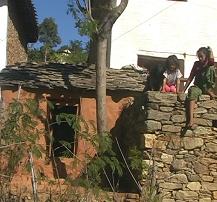
Download Once a month, during their menstruation period, woman in rural parts of Nepal, aren’t allowed to participate in normal family activities.
They are considered impure and have to live in a small hut with no windows, far away from their homes.
The tradition, known as chhaupadi, often leads to depression and in some cases even death.
But recently a village in far western Nepal put an end to the practice.
Sunil Neupane joins the celebrations.
Dozens of people in Bhageshwor village gather in a nearby temple, playing drums and singing traditional songs.
They’re celebrating the end of chhaupadi – a tradition that isolates women during their menstruation period.
Prakash Katri is the head of the local community.
“We formed a special committee to stop this shameful practice in our village. Educated people and community health volunteers are ready to help us. It’s not easy to convince the old people, they’re against our campaign. We had arguments in some areas. They believe that during the menstruation period, women should stay inside the hut or God will be angry. We tried several times but they are not ready for change. So we tried with families where the father and mother or the father-in-law and mother-in-low were prepared to try it out. After the women stayed for a few months inside the main house, nothing happened. So finally we convinced them.”
Under the chauppadi tradition, menstruating women are considered impure.
Therefore they have to live far away from home for up to 4 days, in a hut that is commonly used for cows - with dirt floors and no windows.
They must survive only on dry food, salt and rice.
18-year student Dibya Bohara hates the chhaupadi hut.
“I’m afraid of snakes. I heard that a woman died there because of a snake bite. There’s no light in the hut and someone might attack me during the night. The hut is a 10 minute-walk from my home. And I can’t read anything when I’m inside the hut.”
35-year-old Belu Pandit used to worry a lot about her family every time she had to stay in the hut.
“When I was away, I worried about my sick husband and my children’s welfare. I couldn’t sleep well. But now I can stay at home, I’m very happy. Thank God.”
The huts are very unhygienic; women are often sick with diarrhoea and respiratory problems. In severe situations, they can also suffer from malnutrition.
Even after giving birth, they have to stay in the hut with their babies – this leads to high rates of infant and maternal mortality in western Nepal.
According to local police, 8 women in Accham district have died inside chhaupadi huts in the past four years.
And last month a teenage girl was raped inside one of the huts.
Local NGO Sam Bikash has been working on this issue for years. Program Manager Dhruba Sunar says it’s hard to convince people to stop the tradition.
“We face a big challenge from the local Shamans and religious leaders. They asked for a guarantee for the well being of their family members. They said, if any cattle died as a result menstruating woman staying at home, we would have to give them compensation. It’s hard to convince them. For example, one woman in my village started to stay at home, not in the hut. And then a snake was found at home and rumour spread that this happened because she didn’t stay in the chhaupadi hut. We also face difficulties from educated people who don’t want to end this harmful practice.”
In 2005, Nepal’s Supreme Court ordered the government to abolish chhaupadi.
Three years ago the government published a protocol to bring an end to what it described as an ‘evil practice’.
But in rural areas, people are still following the tradition says Dr Aruna Upreti, a consultant for the NGO British Nepal Medical Trust.
“In some parts far away from the city, the chhaupadi is still strong. Some female activists and community health volunteers are continuing the practice too. When I asked them why, they say it’s because of their in-laws, it’s difficult for them to say no.”
Chhaupadi also stops girls from going to school when they’re menstruating.
School principal, 41-year old Janaki Bohara, is against the tradition.
“In the past, girls couldn’t come to school if they were having their period. We had to take four days leave. But one day I started to come to school. Local people said they were angry with me and that I would die. I was afraid, but when I continued coming to school, nothing happened. And after that, other girls and female teachers also started to come to school during their period.”
Back at the celebrations, 35-year old Parwati Bohara is happy.
“We used to believe that God would be angry if we stayed at home during menstruation. And there were cases of pneumonia when we stayed in the chhaupadi hut. Now we can stay in our own home even when we have our period. Our children and their mothers are now safe.”
But in other parts of the district, women still have to struggle hard...
According to the Women’s Development Office, out of a total of 19 thousand women of reproductive age, only 3 thousand have started staying at home during menstruation.
42-year old Gokul Nath, sees nothing wrong with the tradition.
“We’ve been practicing this tradition for a very long time in our society. My mother is still not ready for any change, how can we expect things to change soon? I think we should wait until the next generation.”












